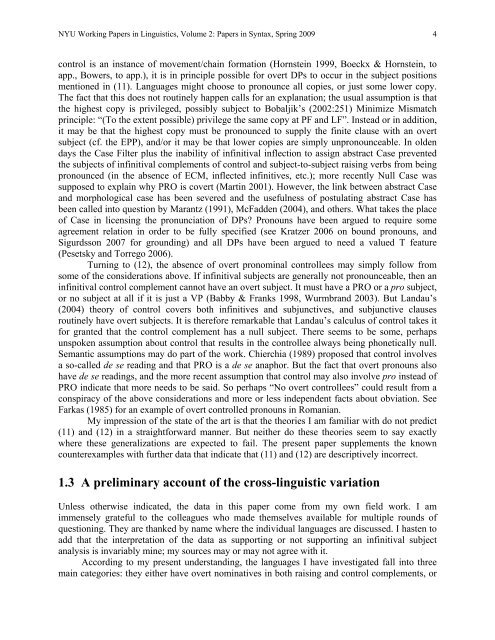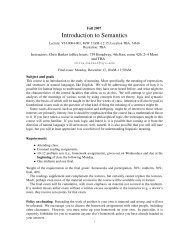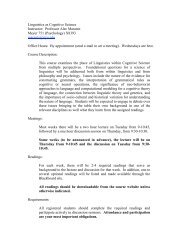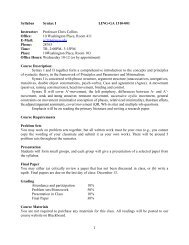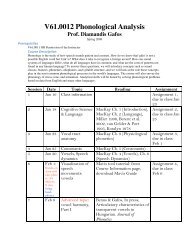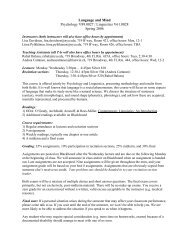Overt Nominative Subjects in Infinitival Complements Cross - NYU ...
Overt Nominative Subjects in Infinitival Complements Cross - NYU ...
Overt Nominative Subjects in Infinitival Complements Cross - NYU ...
Create successful ePaper yourself
Turn your PDF publications into a flip-book with our unique Google optimized e-Paper software.
<strong>NYU</strong> Work<strong>in</strong>g Papers <strong>in</strong> L<strong>in</strong>guistics, Volume 2: Papers <strong>in</strong> Syntax, Spr<strong>in</strong>g 2009 4control is an <strong>in</strong>stance of movement/cha<strong>in</strong> formation (Hornste<strong>in</strong> 1999, Boeckx & Hornste<strong>in</strong>, toapp., Bowers, to app.), it is <strong>in</strong> pr<strong>in</strong>ciple possible for overt DPs to occur <strong>in</strong> the subject positionsmentioned <strong>in</strong> (11). Languages might choose to pronounce all copies, or just some lower copy.The fact that this does not rout<strong>in</strong>ely happen calls for an explanation; the usual assumption is thatthe highest copy is privileged, possibly subject to Bobaljik’s (2002:251) M<strong>in</strong>imize Mismatchpr<strong>in</strong>ciple: “(To the extent possible) privilege the same copy at PF and LF”. Instead or <strong>in</strong> addition,it may be that the highest copy must be pronounced to supply the f<strong>in</strong>ite clause with an overtsubject (cf. the EPP), and/or it may be that lower copies are simply unpronounceable. In oldendays the Case Filter plus the <strong>in</strong>ability of <strong>in</strong>f<strong>in</strong>itival <strong>in</strong>flection to assign abstract Case preventedthe subjects of <strong>in</strong>f<strong>in</strong>itival complements of control and subject-to-subject rais<strong>in</strong>g verbs from be<strong>in</strong>gpronounced (<strong>in</strong> the absence of ECM, <strong>in</strong>flected <strong>in</strong>f<strong>in</strong>itives, etc.); more recently Null Case wassupposed to expla<strong>in</strong> why PRO is covert (Mart<strong>in</strong> 2001). However, the l<strong>in</strong>k between abstract Caseand morphological case has been severed and the usefulness of postulat<strong>in</strong>g abstract Case hasbeen called <strong>in</strong>to question by Marantz (1991), McFadden (2004), and others. What takes the placeof Case <strong>in</strong> licens<strong>in</strong>g the pronunciation of DPs? Pronouns have been argued to require someagreement relation <strong>in</strong> order to be fully specified (see Kratzer 2006 on bound pronouns, andSigurdsson 2007 for ground<strong>in</strong>g) and all DPs have been argued to need a valued T feature(Pesetsky and Torrego 2006).Turn<strong>in</strong>g to (12), the absence of overt pronom<strong>in</strong>al controllees may simply follow fromsome of the considerations above. If <strong>in</strong>f<strong>in</strong>itival subjects are generally not pronounceable, then an<strong>in</strong>f<strong>in</strong>itival control complement cannot have an overt subject. It must have a PRO or a pro subject,or no subject at all if it is just a VP (Babby & Franks 1998, Wurmbrand 2003). But Landau’s(2004) theory of control covers both <strong>in</strong>f<strong>in</strong>itives and subjunctives, and subjunctive clausesrout<strong>in</strong>ely have overt subjects. It is therefore remarkable that Landau’s calculus of control takes itfor granted that the control complement has a null subject. There seems to be some, perhapsunspoken assumption about control that results <strong>in</strong> the controllee always be<strong>in</strong>g phonetically null.Semantic assumptions may do part of the work. Chierchia (1989) proposed that control <strong>in</strong>volvesa so-called de se read<strong>in</strong>g and that PRO is a de se anaphor. But the fact that overt pronouns alsohave de se read<strong>in</strong>gs, and the more recent assumption that control may also <strong>in</strong>volve pro <strong>in</strong>stead ofPRO <strong>in</strong>dicate that more needs to be said. So perhaps “No overt controllees” could result from aconspiracy of the above considerations and more or less <strong>in</strong>dependent facts about obviation. SeeFarkas (1985) for an example of overt controlled pronouns <strong>in</strong> Romanian.My impression of the state of the art is that the theories I am familiar with do not predict(11) and (12) <strong>in</strong> a straightforward manner. But neither do these theories seem to say exactlywhere these generalizations are expected to fail. The present paper supplements the knowncounterexamples with further data that <strong>in</strong>dicate that (11) and (12) are descriptively <strong>in</strong>correct.1.3 A prelim<strong>in</strong>ary account of the cross-l<strong>in</strong>guistic variationUnless otherwise <strong>in</strong>dicated, the data <strong>in</strong> this paper come from my own field work. I amimmensely grateful to the colleagues who made themselves available for multiple rounds ofquestion<strong>in</strong>g. They are thanked by name where the <strong>in</strong>dividual languages are discussed. I hasten toadd that the <strong>in</strong>terpretation of the data as support<strong>in</strong>g or not support<strong>in</strong>g an <strong>in</strong>f<strong>in</strong>itival subjectanalysis is <strong>in</strong>variably m<strong>in</strong>e; my sources may or may not agree with it.Accord<strong>in</strong>g to my present understand<strong>in</strong>g, the languages I have <strong>in</strong>vestigated fall <strong>in</strong>to threema<strong>in</strong> categories: they either have overt nom<strong>in</strong>atives <strong>in</strong> both rais<strong>in</strong>g and control complements, or


